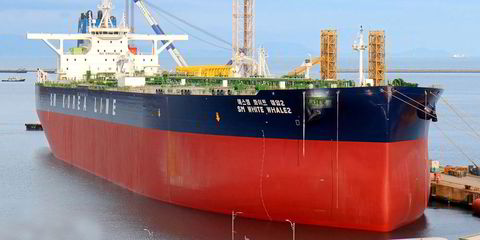Management of new Overseas Shipholding Group (OSG) spinoff International Seaways want to make it clear that they’re not complaining about how the stock is trading in its first few days — even if it may sound a little like they are.
“You’re not going to hear us whine or lecture (Wall Street) on price — that’s not how we roll,” said chief financial officer Jeffrey Pribor, as he presided over the company’s first investor day alongside chief executive officer Lois Zabrocky.
Pribor proceeded to rattle off a few numbers suggesting the stock isn’t getting the credit it’s worth, including an estimate that it’s trading at about half of its net asset value (NAV).
Valuation ‘compelling’
“We have a very compelling valuation,” Pribor said.
The notion of International Seaways as undervalued appeared to gain some traction in midday trading as the stock rose $1.10, or more than 10%, to $11.74.
The gain at least temporarily reversed a trend in which the share has lost ground since it opened trading at $16 last Thursday.
The two managers spent much of this morning trying to sell investors on International Seaways dual strengths of diversification and outperformance in freight markets combined with a low-leverage balance sheet carrying few capital expenditure requirements.
56-tanker fleet
OSG’s long expected spinoff saw all of its 56 internationally trading tankers placed with the new company, while the parent becomes purely a US-flag operator.
OSG has explained this move would create more flexibility and make both publicly traded companies attractive to investors.
International Seaways has had to clear an initial hurdle, however, when its first quarterly results on Monday showed a loss of $50.9m in the third quarter versus a profit of $52m if the company had reported separately a year earlier.

Most of the loss came in a $49.6m impairment charge.
“Why should you invest — low leverage, ample liquidity, low cash breakevens, fixed cash coverage and no newbuilding requirements,” Pribor told investors at today’s New York session.
The company is well placed to take advantage of historically low vessel valuations, Zabrocky (pictured) said.
“We are approaching the lowest entry point in 30 years in the tanker market,” she said. “We feel we are in a very strong position.”




